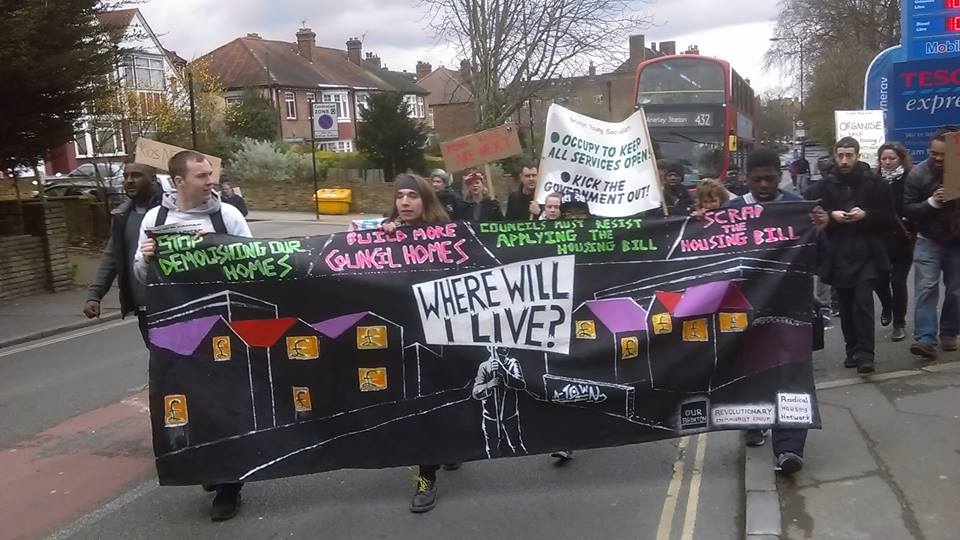
Evictions in England and Wales have reached an all-time high, with an average of 170 tenants a day forced out of their homes in 2015. The number of people sleeping rough has also increased dramatically – up by 30% in the last year. The £115 million diverted by Chancellor George Osborne in his March budget to help rough sleepers is in effect little more than a sticking plaster to cover an embarrassing problem. As housing charities have pointed out, it will do nothing to address the root causes of a spiralling crisis that is a direct result of government housing policies over the last 30 years. This crisis, that leaves thousands of working class people without a roof over their heads, or relegated to overcrowded, unsafe, inappropriate and unaffordable temporary housing, will only be exacerbated in the months and years to come by welfare changes, council estate ‘regeneration’ and the impact of the Housing and Planning Bill. We have no option but to fight back.
As evictions rise…
Evictions from rented accommodation have risen 53% since 2010. The single biggest cause of homelessness is now the ending of an assured private tenancy. In 2015, a record 42,728 households in rented accommodation were evicted. Almost half – 19,093 were from social housing. Meanwhile in London more possession claims – the start of the eviction process – were registered last year by social than by private landlords, a trend that is sure to increase as part of the accelerated process of social cleansing from the capital. A survey of teachers in London said that, where they used to have some idea which of their pupils might be at risk from homelessness, now it was impossible to predict: ‘They are now in a situation where they cannot assume that the children they are teaching have a bed to sleep in… this has become commonplace for many people on low incomes…they have fallen foul of a completely dysfunctional housing system.’ (Kate Webb, Shelter, evidence to Select Committee on Housing, 14 March 2016).
The result is that there are now 1.4 million households on council waiting lists for social housing. Families with children – a priority for rehousing – are increasingly left for rot for years in inadequate temporary accommodation, or (in London) shipped out of their city altogether. There were 1,653 placements of homeless households outside London in 2014/15, compared to the 637 the previous year. There is evidence of local authority housing officers ‘gatekeeping’ – preventing vulnerable adults from getting a place on housing waiting lists, for example by downgrading evidence of mental health issues or disability or telling pregnant women ‘they aren’t pregnant enough’ to be considered in priority need. A number of London councils are seeking to overturn any legal restrictions on their ability to place homeless households in private accommodation or send them out of the city, despite the fact that 82% of landlords in the private rented sector saying they will not rent to homeless people. With further housing benefit restrictions due in October under the overall benefit cap, housing associations are also increasingly refusing to allocate housing to homeless families.
..so does homelessness
The government’s own figures show the number of people sleeping rough in England and Wales has doubled in the last five years. The charity Crisis says it has risen 30% in the last year, with an average of 3,600 people sleeping rough on any one night. The real figure is likely to be even higher as many rough sleepers, for example migrants, take steps to avoid detection. Housing charities also stress that those visible on the streets are just the tip of the iceberg, as thousands more are ‘sofa-surfing’ in overcrowded conditions with family or friends, or making other ad-hoc arrangements.
According to St Mungo’s charity, almost half of all rough sleepers suffer from mental health issues. The average age of death is 47, the risk of violence 13 times the national average. Undercover police are used to catch homeless people begging and charge them under the Vagrancy Act. In Brighton, 62 homeless people were convicted last year, with fines totaling £3,000. 16 have already been up in court this year.
Meanwhile, homelessness services and hostels say they will not survive further funding cuts to supported housing. They have already faced cuts of 45% since 2009-2010. A cut in social rents by 1% added to the cap in Local Housing Allowance means that the majority of hostels will close. St Mungo’s faces a net loss of around £9 million and says within two years its premises, which cater for 2,800 homeless people each night, will be converted into backpacking hostels.
Chancellor Osborne’s budget handout to ‘tackle homelessness’ is a shameful con-trick given the appalling scale of human devastation that is the inevitable result of his party’s policies on housing and benefits. The Labour Party, with its embrace of the market and acceptance of unaffordable ‘affordable’ housing and the enthusiasm shown by Labour councils for demolishing what social housing remains, is in practice no better. There is an urgent need for a real fight, led by those directly affected by the brutal reality of insecure and inadequate housing and the threat of homelessness, that demands decent, affordable housing for all.




